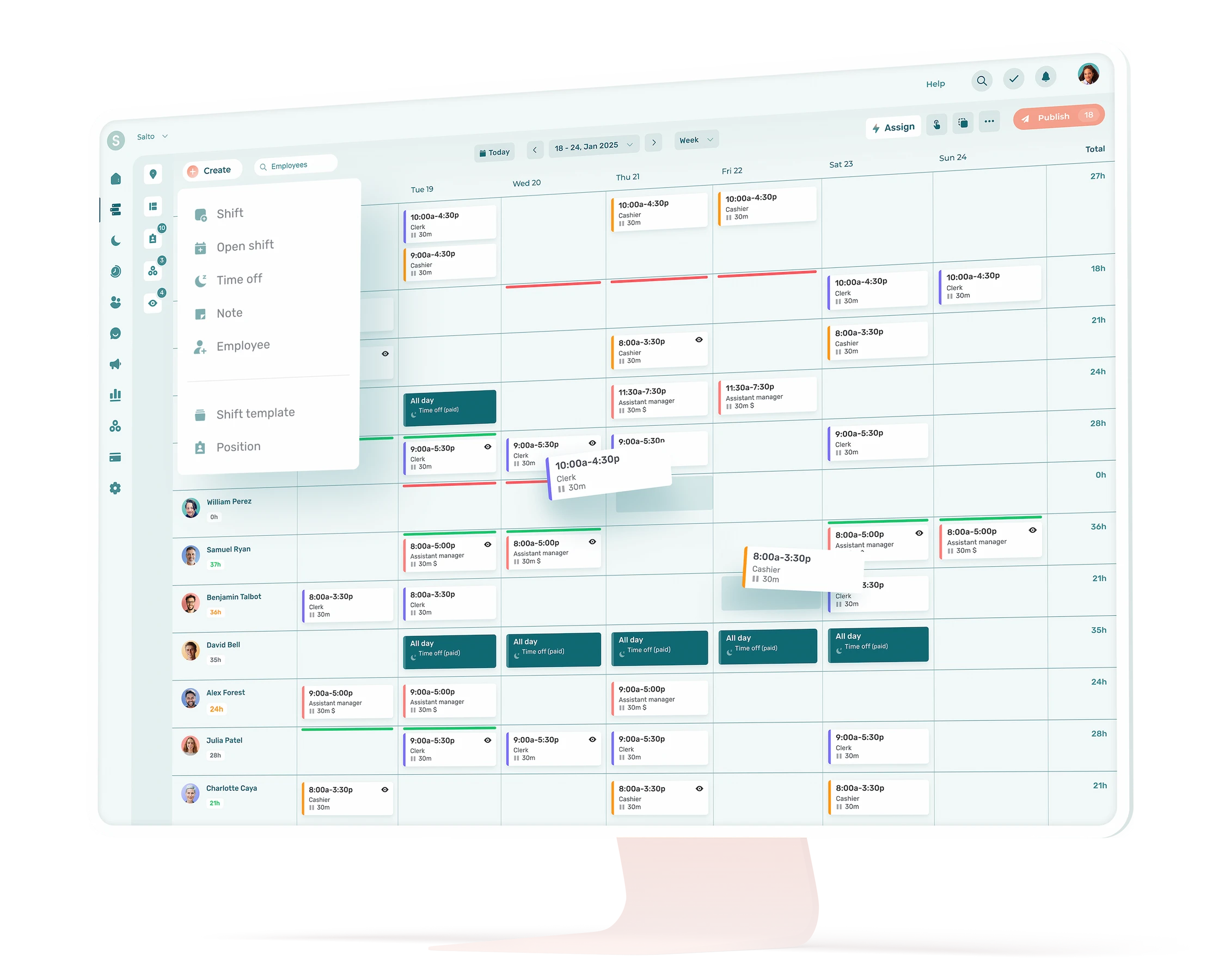Hiring young employees can be a very attractive solution for employers who are struggling to find staff. But be advised—you’ll need to factor in the particularities of this labor force, especially regulations in place.
No field or industry is immune to the current labor shortage. While the situation is challenging for entrepreneurs, SMEs and managers, some people see a silver lining: young employees who are just starting their careers.
This new generation of workers aged under 18 is driven, hard-working and ready to take their place in companies. Are you thinking of hiring young people to make up for a staff shortage? Take the time to get informed first!
In this post, I explain the pros and cons of hiring young employees, your responsibilities as an employer, and the 6 golden rules to follow.
What Is a “Young Employee”?
Employees who are minors (under the age of 18), are deemed to be young employees under the law.
You may be surprised (as I was) to learn that in Quebec, before March 2023, there was no minimum age for people wishing to take on their first job. 🐥
Yep, you read that right. Young workers were able to start as soon as they wanted. This all changed last March when Quebec’s Minister of labor made a clear statement: children under the age of 14 don’t belong at work (apart from a few exceptions), but rather on school benches.
Law 19 Now in Effect in Quebec to Protect Young Employees
The Quebec government announced details of the new law that changes current legislation for young workers, including:
- The legal age to work in Quebec is now 14 years old, aside from a few exceptions: babysitting, day and summer camps, help with homework, some jobs related to art like being a you tuber or an influencer, as well as work for the family business with less than 10 employees when you are the child of the owner or their spouse.
- Working hours cannot exceed 17 hours a week during the school year for young workers 14 and over. Maximum worked hours on weekdays (Monday to Friday) is 10 hours.
All the regulations are in effect since September 1, 2023. Fines will increase for employers who do not respect them: $1,200 for a first time offender, then $12,000 for following offenses.
Rules for Minor Employees in Quebec
Here are the laws in place when it comes to hiring young employees, in addition to the new points above.
Employees Under 16
- May not work during school hours.
- Must be able to be at home between 11 p.m. and 6 a.m. (with certain exceptions).
Employees Under 18
- Have no restrictions on their work schedules.
- Cannot be assigned work beyond their capabilities.
Note that the rules pertaining to older age groups also apply to younger age groups. For example, working conditions for young people 16 and under must also follow the rules for the 18 under age brackets.
Hiring Young Employees: Pros and Cons
Hiring young people has many pros and cons—both for managers and for the young workers themselves.
On the one hand, a first experience on the job market can be very formative and give young people a foretaste of independence. And it can also allow an SME to fill some of more difficult shifts, for example on weekends.
On the other hand, employers need to be more aware that these young workers have to juggle other priorities than their jobs, such as their studies. For these companies, a people-first approach to staff management is critical.
Young people are young people: they need balanced lives and it is never acceptable for their job to be their grounds for dropping out of school.
The Pros of Hiring Young Employees
Rounding Out Their Academics
- Developing organization skills, responsibility and discipline.
- Picking up professional skills and technical knowledge, such as how to count cash or provide customer service.
- Self-knowledge and potential longer-term professional interests.
- Smoother transition from school to the workforce.
Experience on the Job Market
- Exploring work culture and developing behavioral skills such as punctuality and communication.
- Meeting mentors and adults who can have a positive influence on their development.
- Developing their sense of self-worth and recognition by peers.
- Training a sustainable workforce: some employees may stay on with the same employer throughout their studies and even beyond.
Assets for Personal Life
- Having greater financial and overall autonomy.
- Enjoying greater self-esteem and sense of pride.
The Cons of Hiring Young Employees
Competition With Their Studies
- Less energy and less time to study.
- Lower focus and motivation in the classroom.
- Potentially higher absenteeism.
Risks for the Employer
- Lower general performance, while the employee learns the ropes.
- Complex schedules with more shifts and more employees to manage.
- Higher likelihood of lateness and absenteeism due to personal constraints such as school and transportation.
- Heightened risk of injury and accidents.
Detriment to Personal Life
- Greater stress, which can lead to a lack of sleep.
- Potential deterioration in eating habits and certain risks related to being around older workers, such as being introduced to cigarettes, alcohol and drugs.
- Less physical activity and fewer social activities due to lack of time.
As you can see, hiring young employees isn’t a black or white issue. This being said, if things are done right and the company implements people-first management, there is a good chance it will be a win-win for everyone.
Personal Experience: My First Job
For my first-ever employment experience, I found a job as a clerk in the fruit and vegetable department of a supermarket at the age of 15. I had had a few work experiences before, including strawberry picking, babysitting, and bookkeeping for my family’s business, but this first experience at a business was something else altogether.
There was a specific schedule to follow, such as 15-minute breaks at 4-hour intervals and meal breaks. Having to manage my time this way was new to me, as was punching in and out. ⏱️
The supermarket was very busy on Saturday mornings, so this shift was quite difficult since we had to come in to work early to put up the stands before customers arrived. We then had to be able to meet the demand and make sure the shelves remained stocked, while taking care of food rotations so nothing would go to waste.
This job allowed me to take responsibility and learn diligence, meticulousness and punctuality. I also learned about customer service and communication. The position served as a springboard to other jobs with more responsibilities, but it was this first job that helped me gain some experience and develop my independence.
My first job is what allowed me to buy my first car—an achievement that gave me tremendous pride and freedom. 🚗
I was lucky to have a boss who took my education into account; I only worked weekends, between Friday evening and Sunday. As this experience demonstrates, when done right, hiring a young person can indeed be positive.
6 Golden Rules for Hiring Young People
If you’re thinking about employing younger workers, we’ve put together some golden rules to help you out. Being well-informed is key in order to put the right conditions in place.
1. Make Sure You Have a Safe Work Environment
Hiring an inexperienced workforce will require you to establish health and safety measures in order to make sure your work environment is safe and sound. CNESST offers a very handy risk management tool organized according to industry.
2. Offer Training Adapted to Young Employees
Make sure your young employees get all the training they need and master the proper work techniques to avoid accidents. For example, if they will be using knives or other potentially hazardous tools, take the time to train them thoroughly.
3. Provide Flexibility and Schedules That Allow for a Good Balance
In addition to the time constraints associated with their studies, many teenagers depend on school transportation or their parents’ availability to get around. These constraints may sometimes require them to leave or arrive at a different time than their scheduled shift. Stay open and flexible—this is vital in order to hang on to your younger employees.
Create work schedules that deliver both balance and flexibility: your young employees need time to recover, do homework, engage in social activities, etc.
With scheduling software like Agendrix, managers can view in a glance planned schedules of the entire team. They can identify if an employee has more hours scheduled than they should for a given week. They can also see if some employees have some bandwidth to work more hours.
Some periods can be more difficult for people in school, such as the end of the semester or exam times. Allowing young workers to temporarily suspend their employment or reduce their work hours is sure to be greatly appreciated.
Regularly survey your employees to determine their availability, as it will likely change several times a year. You can use an employee availability form or scheduling software to make this easier.
4. Minimize Your Impact on Their Academic Success
As you may have noticed, I’ve mentioned the importance of young people’s education several times in this post. So it will come as no surprise that this is one of the golden rules we advocate. Having a job should never interfere with a young person’s education, period. Do everything you can to make sure your young workers are able to maintain a balance.
5. Offer Long-Term Career Development Opportunities
For the time being, your young employees will be novices who are only available part-time. But in a few years, they will enter the labor force full time: they are the workers and managers of tomorrow. You have a unique opportunity to spot high-potential individuals and support them in their development.
Provide opportunities for skill development, draw up a suitable training plan, and support your rising stars in their career development. Who knows… they might stay on and start their career with you after they graduate! 👩🎓
6. Encourage Further Education With Scholarships
The financial independence that comes with a first job is very appealing to young people. However, schooling must remain a priority. Sparking young people’s interest by offering them scholarships or other financial compensation for obtaining a diploma is a fantastic way to combat school dropout.
One company in Beauce offers scholarships to their student employees upon graduating from high school. This inspiring example may give you some ideas. Why not pay a portion of tuition for student employees going to CEGEP or earning a degree in a field related to your industry?
Finding the Right Balance for Young Employees
A job can be beneficial to a young person if it strikes the right balance, is properly structured, and takes into account the needs of younger workers. After all, for the up-and-coming generation, there are many benefits to spending a few hours working on weekends instead of wasting time on TikTok or playing video games!









